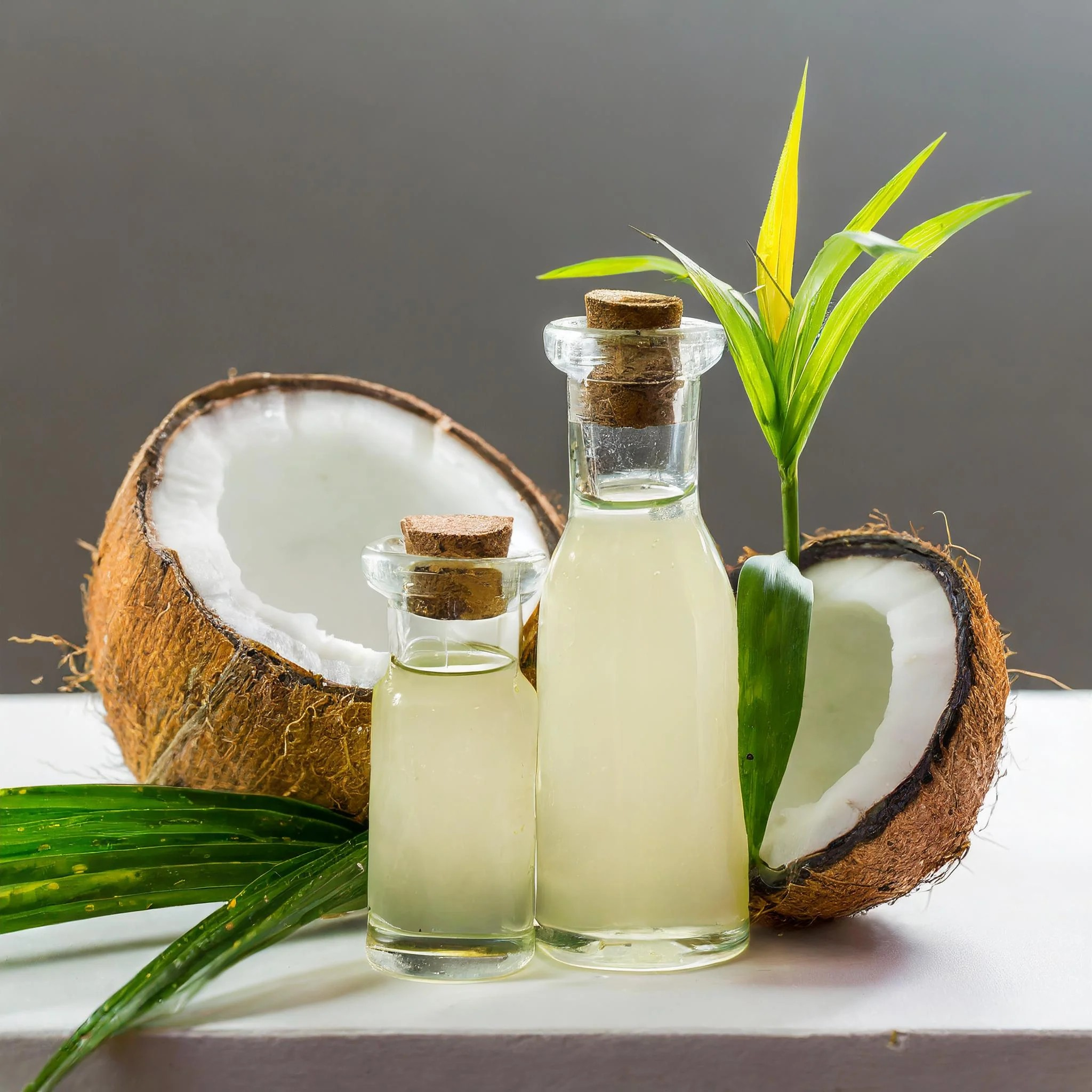The Refined vs. Unrefined Coconut Oil Debate: What’s Best for Your Body, Kitchen, and Beauty?
Crafted by: Jonathan Chew

Coconut oil has recently gained immense popularity for its versatility, whether for cooking, skincare, or even hair treatment. However, with all the buzz comes a common question: Should you choose refined or unrefined coconut oil? Both have distinct qualities and uses, so understanding their differences can help you make more informed choices in your daily life.
This guide explores the similarities and differences between refined and unrefined coconut oil, exploring its health benefits, best uses, and storage tips. Whether you’re cooking a high-heat dish or looking for a natural skin moisturiser, there’s a type of coconut oil for every occasion.
What Is Unrefined Coconut Oil?
Unrefined coconut oil, also known as virgin or extra-virgin, is the purest form of coconut oil. It’s extracted directly from coconut meat, either dry or wet, without undergoing additional processing. This means unrefined coconut oil retains much of its natural flavour, aroma, and nutrient content.
- Fresh coconut meat is heated in the dry method, and the oil is pressed out.
- The wet method involves pressing the oil from the coconut and the milk, separating the two.
Unrefined coconut oil is often labeled cold-pressed, meaning it was extracted without heat, preserving its rich nutritional profile. Cold-pressed oil is generally more environmentally friendly, requiring less energy in production, though it yields a smaller amount of oil, making it more expensive.

Unrefined coconut oil contains essential nutrients like vitamin E, K, and medium-chain triglycerides (MCTs), especially lauric acid, constituting around 48-53% of its fatty acid profile. Lauric acid offers a rapid energy source, supports easier digestion, and boasts impressive antimicrobial, antifungal, and anti-inflammatory benefits.
Health Benefits of Unrefined Coconut Oil
The benefits of unrefined coconut oil extend beyond just flavour:
- Heart Health: While some debate remains, studies have shown that coconut oil may raise HDL cholesterol (good cholesterol) without raising LDL cholesterol (bad cholesterol), potentially benefiting cardiovascular health.
- Digestive Health: The MCTs in unrefined coconut oil, such as lauric acid and caprylic acid, are accessible for the body to metabolise and provide quick, digestible energy.
- Antimicrobial Properties: Thanks to its high lauric acid content, unrefined coconut oil has natural antimicrobial and antifungal properties, which can benefit the immune system.
However, due to its high saturated fat content, it is recommended that daily intake be limited to 1-2 tablespoons.
Storing Unrefined Coconut Oil
For maximum freshness, store unrefined coconut oil in a cool, dark, and dry place away from light and heat. Coconut oil solidifies at room temperature, so gently warm it before use if you need it in liquid form.
What Is Refined Coconut Oil?
Refined coconut oil goes through more processing than unrefined oil. The extraction method is similar to the dry method used for unrefined oil, but refined oil undergoes additional steps like degumming to remove impurities. This extra processing eliminates the coconut flavour and aroma, producing a neutral-tasting oil.
Refined coconut oil when exposed to heat during refining, may reduce its antioxidant and polyphenol content. However, not all refined coconut oils are created equal. Some are produced using chemicals like hexane, while others are steam-refined, which is a more natural method of processing that still preserves beneficial vitamins and fatty acids.
Health Benefits of Refined Coconut Oil
Although refined coconut oil may contain fewer nutrients than its unrefined counterpart, it still offers many benefits when choosing a high-quality product. It remains rich in MCTs like lauric acid, making it a quick energy source.
For those concerned about the chemicals used in conventional refining processes, it’s best to opt for organic refined coconut oil. Organic varieties are processed without harmful chemicals, reducing potential toxic exposure.
Storing Refined Coconut Oil
Despite its higher level of processing, refined coconut oil has a shorter shelf life than unrefined oil. It can typically last 18 to 24 months if stored in a cool, dark place, or you can refrigerate it to extend its shelf life.
Critical Differences Between Refined and Unrefined Coconut Oil
Here’s a breakdown of the primary differences between these two types of coconut oil:
- Nutrient Content: Unrefined coconut oil retains higher levels of antioxidants and polyphenols.
- Smoke Point: Refined coconut oil has a higher smoke point (about 450°F) than unrefined coconut oil (350°F), making it better for high-heat cooking.
- Flavour: Unrefined coconut oil has a distinct coconut flavor and aroma, while refined coconut oil is neutral in taste.
- Price: Unrefined coconut oil is usually more expensive due to its lower yield and minimal processing.
- Shelf Life: Refined coconut oil generally has a shorter shelf life, lasting up to 24 months, while unrefined coconut oil can last three to five years if properly stored.
When to Use Refined vs. Unrefined Coconut Oil
Both refined and unrefined coconut oils have their place in the kitchen and beyond. Here’s when to use each:
- Cooking: Either type works for cooking, but refined oil’s higher smoke point makes it better for high-heat applications like frying or sautéing. Unrefined oil, rich in nutrients, works well for low-heat cooking.
- Baking: Refined coconut oil’s neutral flavor makes it ideal for baking, as it won’t overpower your dish. However, unrefined oil works well if your recipe complements the taste of coconut, such as in tropical-flavored desserts.
- Skincare: Unrefined coconut oil is rich in vitamin E, which supports skin health, so it’s preferred for use in natural skincare routines. Its emollient properties help moisturize and soothe skin.
- Hair Care: Use unrefined coconut oil for hair treatments to take advantage of its higher nutrient content, which can nourish dry or damaged hair.
- Oil Pulling and Oral Health: Both refined and unrefined coconut oil can be used for oil pulling, a practice believed to help with oral hygiene by trapping bacteria and reducing plaque. The lauric acid in coconut oil may provide additional antibacterial benefits.
- Sexual Health: Unrefined coconut oil can also be used as a natural lubricant during sexual activity. It’s free from chemicals and additives found in commercial lubricants, and its moisturising properties help maintain a healthy vaginal ecosystem.
Conclusion: Which Coconut Oil Is Best for You?
There’s no one-size-fits-all answer when choosing between refined and unrefined coconut oil. Unrefined coconut oil has the edge regarding nutrient content and flavour, making it a great choice for low-heat cooking, baking, skincare, and hair care. On the other hand, refined coconut oil is more versatile for high-heat cooking and baking, thanks to its neutral flavour and higher smoke point.
Ultimately, your choice depends on your needs, lifestyle, and how you plan to use the oil. For cooking, skincare, and natural health practices, both types of coconut oil can play a role in your routine, offering various benefits based on their processing methods and uses. However, it is also highly advisable to consult Nutritional & Functional medicine practitioners for more information on dietary.

